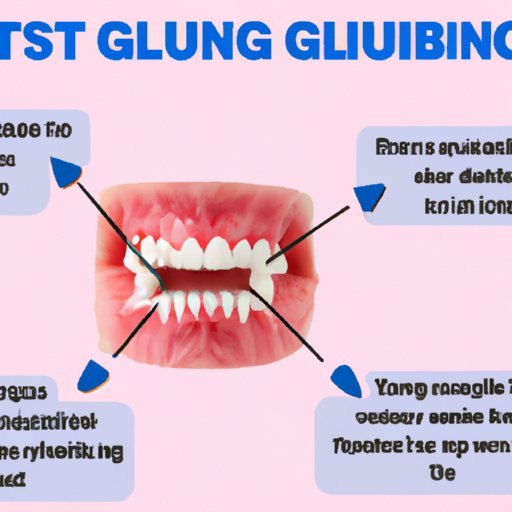
How to Stop Gums from Bleeding: Tips for Good Gum Health
Have you ever noticed a bit of red in the sink when you brush or floss your teeth? Bleeding gums are a sign of poor gum health and can be caused by a variety of factors. If left untreated, bleeding gums can lead to more severe gum disease and tooth loss. In this article, we will go over the common causes of bleeding gums, discuss preventative measures and treatment options, and provide tips for good gum health.
Understanding the Causes of Bleeding Gums
The most common cause of bleeding gums is gum disease, which has two main stages: gingivitis and periodontitis. Gingivitis is an inflammation of the gums caused by plaque buildup, and it can lead to red, swollen, and bleeding gums. If left untreated, gingivitis can progress to periodontitis, which is a severe inflammation of the gums that can eventually lead to tooth loss. Other causes of bleeding gums include brushing too hard, vitamin deficiencies, hormonal changes, and certain medications.
To prevent bleeding gums caused by gum disease, it is essential to follow a consistent dental care routine. Brush your teeth twice a day, floss regularly, and use an antiseptic mouthwash to kill bacteria and freshen your breath. A healthy diet rich in vitamins and minerals can also improve gum health and prevent bleeding.
Incorporating a Better Oral Hygiene Routine
To maintain good gum health, it is important to incorporate a consistent oral hygiene routine. Brushing and flossing your teeth daily can prevent plaque buildup and reduce your risk of developing gum disease. Use a soft-bristled toothbrush and fluoride toothpaste to brush your teeth gently but thoroughly. Hold your toothbrush at a 45-degree angle to the gums and use circular motions to brush each tooth’s surface and the gums.
Flossing removes food particles and plaque from between teeth and the gum line, which can prevent gum disease and tooth decay. Use a piece of floss about 18 inches long and wrap it around your fingers to provide a taut line. Gently insert the floss between each tooth, and make a sawing motion to remove debris.
If you have bleeding gums, consider using a toothbrush with soft bristles to avoid irritating the gums. You can also try using a toothpaste formulated for gum health, such as one containing fluoride and antibacterial ingredients. Be sure to replace your toothbrush every three months or when it becomes frayed.
Visiting your dentist regularly can also help maintain your oral health. Your dentist can evaluate your overall gum health, provide preventative measures or early treatment for any issues detected, and offer advice on how to maintain good oral hygiene.
Diet & Nutritional Advice
Eating a healthy diet rich in vitamins and minerals can also improve gum health and prevent bleeding. Vitamin C is essential for collagen production and can help prevent gum inflammation. Some foods that are high in vitamin C include oranges, strawberries, and kiwi fruit. Additionally, calcium and vitamin D can help keep teeth and gums strong. Foods such as milk, cheese, and yogurt are high in these minerals and can promote good oral health.
On the other hand, certain foods can harm your gums and increase your risk of bleeding. Foods high in sugar and carbohydrates can encourage plaque buildup, leading to gum disease. Sticky foods, such as dried fruit and caramel, can also cause problems because they can stick to the surface of your teeth and gums and promote bacterial growth. Drinking water and chewing sugarless gum can help clean your teeth by stimulating saliva production, which neutralizes bacteria.
Supplements can also help to improve gum health. CoQ10 is an antioxidant that can help prevent gum inflammation, while vitamin C supplements can help promote collagen formation to strengthen gums.
Natural Remedies
Natural remedies can be used to prevent and treat bleeding gums. Saltwater rinses are an effective way to kill bacteria and soothe inflamed gums. Simply add a teaspoon of salt to a cup of warm water, swish the water around your mouth for 30 seconds, then spit it out in the sink.
Oil pulling is another natural remedy to improve gum health. Swishing coconut oil in your mouth for 15–20 minutes can help remove bacteria and improve gum health. Adding a few drops of tea tree or peppermint oil can also help reduce inflammation and pain.
Natural mouthwashes that contain ingredients such as echinacea, calendula, and myrrh can also help reduce inflammation and promote gum health.
Medical Treatments
If your bleeding gums are due to gum disease, your dentist may recommend more invasive treatment options. Scaling and root planing are procedures that help remove plaque and tartar buildup. Prescriptive mouthwashes and antibiotics can also help treat gum disease by killing bacteria. In severe cases, gum surgery may be necessary.
Warning Signs & When to See a Professional
It is important to be aware of the warning signs of gum disease, which include bleeding gums, bad breath, receding gums, and loose teeth. If you experience any of these symptoms, or if your gums are bleeding frequently, it’s essential to see a dental professional immediately. Your dentist can evaluate your overall oral health and recommend a suitable treatment plan to prevent or treat gum disease.
Conclusion
Bleeding gums are a common problem, but they can be prevented and treated. By incorporating a consistent oral hygiene routine, following a healthy diet, and seeking professional help if necessary, you can promote good gum health and prevent gum disease. Remember to brush your teeth twice a day, floss daily, and see your dentist regularly to ensure optimal oral health.




